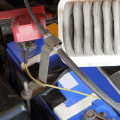How to Know If You Need a New HVAC and Why Filter Size Matters
To determine if a new system is necessary, keep an eye out for signs like decreased comfort levels, strange noises, or rising energy costs.
Often, these symptoms suggest inefficiency or an impending breakdown. If the unit has been in service for over ten years and exhibits such issues, it may be time for a replacement.
When selecting an AC filter, begin by measuring the dimensions of the current filter. Next, check the MERV rating to gauge how effective it is; higher ratings indicate better filtration. Ensure the filter type matches the system's airflow needs.
Regular maintenance and timely filter changes play vital roles in maintaining optimal performance.
There's plenty more to explore about these processes, including tips for enhancing operational efficiency.
Key Takeaways
• Keep an eye on comfort levels along with any strange noises; such signs might show HVAC system issues or the need for replacement.
• Systems older than ten years with regular problems should prompt consideration for a new installation to reduce repair expenses.
• Conducting an energy audit can reveal inconsistent temperatures and elevated energy bills, indicating inefficiency and the potential need for a new system.
• To determine the right AC filter size, check current filter dimensions or measure length, width, and thickness.
• Review the MERV rating; higher ratings enhance air quality but may impact airflow, so finding a balance between efficiency and system requirements is essential.
Signs You Need a New HVAC
Changes in comfort levels within your home can indicate the need for a new HVAC system. If heating or cooling falls short, it's essential to examine the situation more closely.
Unusual sounds, such as banging or grinding, often point to mechanical problems that could escalate over time. Such noises may mean that certain components are failing and need urgent attention.
Calling for repairs frequently can serve as another warning sign. When service is needed multiple times each year, assess whether repair costs exceed the price of a new system.
An aging unit might struggle to meet your home's needs, leading to higher energy bills and fluctuating temperatures.
If your system exceeds ten years of age and displays these symptoms, investing in a replacement could be more cost-effective than continuously repairing an outdated unit.
Critically evaluating performance helps ensure comfort throughout every season.
Assessing HVAC Lifespan
An HVAC system generally lasts between 10 to 15 years. This lifespan depends on several factors such as how often it's used, maintenance practices, and quality of installation.
To maximize longevity, regular HVAC upkeep is imperative. Tasks such as changing filters, cleaning ducts, and scheduling professional inspections shouldn't be overlooked. Ignoring these responsibilities can lead to decreased efficiency and a shorter lifespan.
Quality of installation also plays a significant role. If a system is installed incorrectly, it may not operate efficiently, resulting in early breakdown. Investing in expert installation often proves beneficial over time.
Considering system upgrades is another important aspect. With advancements in technology, newer models tend to be more energy-efficient and dependable compared to older versions.
Evaluating Energy Efficiency
How to know if you need a new HVAC system? Start with an energy audit, which identifies energy consumption versus output. This assessment uncovers areas where systems may underperform, resulting in higher energy bills.
Signs to watch for include inconsistent temperatures, unusual noises, or frequent breakdowns. Such indicators suggest inefficiency. Noticing any of these problems might signal the need for upgrades. Transitioning to a more efficient model can significantly lower energy use and enhance comfort within homes.
Also, check the SEER rating. A higher rating generally indicates improved efficiency. If the rating falls below 14, an upgrade could be beneficial.
Choosing the Right AC Filter
Various filter types exist, and each type possesses unique qualities that affect air quality and system efficiency.
Fiberglass filters remain economical but may struggle to capture smaller particles effectively. Pleated filters offer improved filtration and often last longer, making them a favored option. HEPA filters deliver the highest level of air purification but can restrict airflow if systems aren't designed for them.
When selecting a filter, consider specific needs, including allergies or pets, alongside the efficiency rating of each type. Following maintenance tips ensures maximum performance.
Learning about filter types and adhering to maintenance guidelines ensures AC systems operate smoothly and efficiently, creating a comfortable environment in homes.
Measuring AC Filter Size
Start by examining the existing filter in your setup. Most filters display their dimensions on the side, usually in inches. If the size isn't visible, utilize a tape measure to find the length, width, and thickness. Measuring in inches guarantees compatibility with standard filter types.
Next, explore available filter materials. Common choices include fiberglass, pleated, and HEPA filters, each providing different levels of filtration efficiency. Depending on specific needs, opting for a higher-grade filter can capture smaller particles, enhancing air quality indoors.
Once measurements are obtained, shop for filters that correspond with those dimensions. When choosing a filter, review the MERV rating, which reflects its effectiveness. Higher ratings indicate better filtration but may restrict airflow, so balancing efficiency with system requirements is essential.
Frequently Asked Questions
How often should I schedule maintenance?
Scheduling should occur at least twice annually. Following these frequency guidelines helps maintain efficiency. Utilize a maintenance checklist to cover essential tasks.
What are the benefits of upgrading my HVAC?
Upgrading HVAC systems brings energy savings, improved comfort levels, and reduced noise. Enhanced air quality, positive impacts on the environment, and smart technology benefits create a more efficient, enjoyable home atmosphere.
Can I install an HVAC system myself?
Tackling a DIY HVAC installation is possible, but it presents challenges. Research extensively and follow critical installation guidelines. Improper setup may result in inefficiency or safety hazards. Seeking professional assistance is wise if uncertainty arises.
What is the cost of a new HVAC?
Costs can vary greatly, generally falling between $3,000 and $7,000. Factors such as system type, home dimensions, and local labor rates play a significant role in determining overall pricing.
How can I improve my system's efficiency without replacement?
Start by sealing ducts to stop air leaks. Lowering thermostat settings can also help, ensuring optimal system performance without added strain, ultimately saving energy and expenses.
Learn more about HVAC Care from one of our HVAC solutions branches…
Filterbuy HVAC Solutions - West Palm Beach FL
1655 Palm Beach Lakes Blvd., Ste 1005 West Palm Beach, FL 33401
(561) 448-3760






